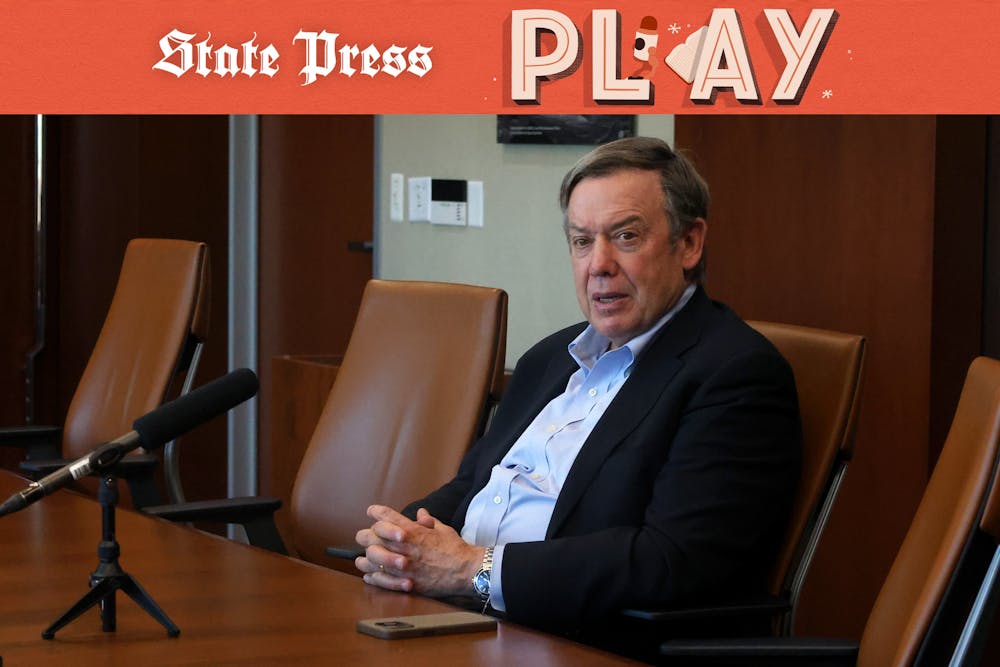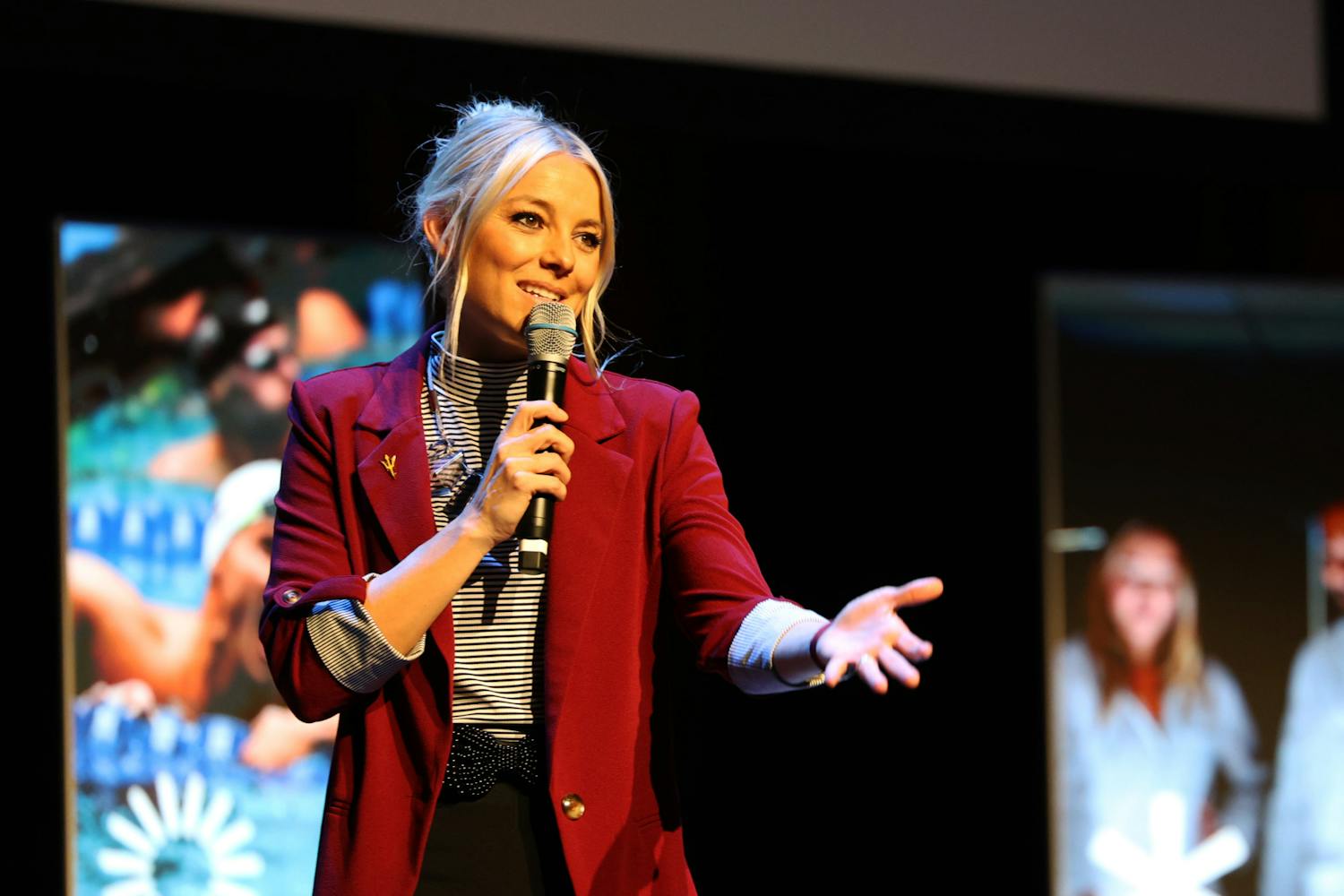State Press podcast transcripts are produced by a third-party transcription service and may contain errors. The official record for State Press podcasts is the audio. Please listen to the audio as this transcript may only contain summary forms of the given episode.
Abby Bessinger:
Welcome back to the podcast! In this episode, we sat down with University President Michael Crow.
Tyler Abrams:
For another, shall we say, 'Crow-versation?'
Abby Bessinger:
And, we also compare how previous ASU basketball players who have transferred out of ASU are performing at their new schools.
Tyler Abrams:
I’m Tyler Abrams.
Abby Bessinger:
I’m Abby Bessinger, and this is State Press Play.
Tyler Abrams:
Also this week State Press podcast reporter Nate Gyore, explores the diverse opinions of how OpenAI is changing the field of art.
Abby Bessinger:
But first ...
Nate Gyore:
Artificial intelligence is one of the fastest developing and discussed technologies of the past few years. At the forefront of this development is the research organization OpenAI, with the revolutionary text model ChatGPT. But the training of artificial intelligence raises ethical concerns.
I’m here with State Press Reporter Kasturi Tale to discuss the reactions ASU faculty and students of the arts have to ASU’s recent partnership with OpenAI and commitment to the application and further development of artificial intelligence.
Kasturi, thanks for sitting down with me today.
Kasturi Tale:
Thanks for having me.
Nate Gyore:
So can you explain ASU's announcement? What does this partnership with OpenAI mean?
Kasturi Tale:
Basically, from what I understand, OpenAI has partnered up with ASU to give them access to chat GPT Enterprise, which is essentially chat GPT for businesses.
It is not accessible to all students and faculty yet, but researchers and some faculty can gain access to it after their proposal is approved. Access to ChatGPT Enterprise is limited right now, but there is a vast scope for researching and learning new things.
Nate Gyore:
For people that aren't aware of the topic, can you explain some of the controversies surrounding AI, how it's trained? What it means?
Kasturi Tale:
From what I learned from Professor Shawn Lawson during my research, it is a lot about how data used in machine learning is tagged with text information. This information is tagged by someone who is often doing free and unpaid labor that happens in foreign countries. Based on the biases of this person who tagged the information, it becomes biased.
I also got to read about Joy Buolamwini of the Algorithmic Justice League, who realized that the face tracking and image tracking had been done by Caucasian and Asian men mostly, and she, being a Black woman, was not findable by the face tracking system until she put on a white mask.
I think that was really, that was like one of the most interesting things I learned about when I was doing research for the story. There's also a lot to be found out about how our usage of CAPTCHA also trains AI to get better at it and how it's slowly getting better at copying styles of art and other things. It's a little scary to think about, but it's also a new thing that we get to explore.
To hear more from Tale, please tune in to State Press Play.
READ MORE: OPENAI AND THE ARTS AT ASU
Tyler Abrams:
This basketball season for ASU was marked by highs and lows for fans of the program. The most recent blow to the program came in the form of starting guard Jose Perez leaving ASU just days before the Pac-12 tournament. However, his departure calls attention to a trend of star ASU basketball players leaving the program for opportunities on other teams.
Henry Smardo has more on the reasons these players may have transferred and the impact this leaves on the ASU basketball program.
Thanks for coming on the podcast Henry.
 enry Smardo:
enry Smardo:
Thanks for having me.
Tyler Abrams:
Alright Henry, so nearly every season students are hearing about another student transferring out of Sun Devil Athletics.
Can you give us a breakdown of the reasons why athletes have left and to which programs have they left to?
 enry Smardo:
enry Smardo:
Well, like you mentioned, Jose Perez, just the most recent, that was kind of an unusual situation leaving before the Pac-12 tournament. Usually it comes during the off season and kind of around that, but Jose Perez had to leave and it kind of came to a shock to everybody and he's now playing international and he kind of wanted to, I think, try to get a jump on his pro-career, just do what was best for him. And from what it sounds like, his team respects that, and Bobby Hurley, head coach, respects that.
In other senses, just the transfers, there's been guys like DJ Horne for NC State, you know, NC State won their conference tournament. They beat Duke, Virginia, North Carolina, and then taking on Texas Tech in the first round, and, you know, DJ Horne's been a big part of that, a leader on that team.
Jaelen House was a guy that we had a couple of years back, who, you know, he was good for ASU and now he decided to transfer and he's been at the University of New Mexico for a couple of years now. And he led the University of New Mexico to the Mountain West title and now they have their spot in the tournament and he's been a big success. Those two guards that we had, they could've been something big, but they decided to move on.
And we had two guys that went over to Texas Tech, Devan Cambridge and Warren Washington and we brought on a guy this year, Shawn Phillips. And I think, if I remember correctly, Hurley talked about Warren Washington maybe starting this season and having Shawn Phillips develop as a second unit center behind him, but that didn't work out how he was hoping and now Warren Washington is on a tournament team that took his his team to the semifinals of their conference tournament. And they're in the tournament now they're actually playing NC State in the first round and so it'll be kind of a battle of former ASU players, but yeah him and Devin Cambridge both on Texas Tech now.
So yeah we've had some some guys that we've had to lose that, you know, are making impacts in other places so yeah.
Tyler Abrams:
Why is this happening? I'm sure the transfer portal has played a large part in how easy it is for players to move across conferences and across teams. However, ASU is still a Division 1 program and in theory should be developing a lot more talent than having more talent transfer out, right? So what is hindering ASU from retaining this top tier talent?
 enry Smardo:
enry Smardo:
I think that guys want to go to a program that has found success in their recent years with players who are still on the team or, you know, the head coach. And ASU has found some success, they made the first round of the tournament last year, but they haven't made any great deep runs as of recent. And, you know, this year with a losing season and kind of going out how they did, I don't think that that is something that maybe players who can immediately make an impact or know they can immediately make an impact want to come into, you know, they want to come into a successful program.
And so I think they're, maybe there is guys that want to transfer to ASU because they think that it could be their place to maybe get a little bit more minutes and kind of make their star debut. But I think that just the fact that the program has struggled a little bit in the past few years and guys that can make an immediate impact, guys that are all conference level players, they just, they want to come into somewhere where they know they can be successful and usually that maybe is a team that already is successful.
To hear more from Smardo, please tune in to State Press Play.
READ MORE: FORMER SUN DEVIL BASKETBALL PLAYERS SHINE IN NEW ROLES AFTER LEAVING ASU
READ MORE: ASU BASKETBALL SET TO FACE UTAH IN THE LAST PAC-12 TOURNAMENT WITHOUT JOSE PEREZ
READ MORE: JUNIOR GUARD JAMIYA NEAL ENTERS TRANSFER PORTAL FOR SECOND SEASON IN A ROW
READ MORE: ASU FRESHMAN GUARD BRAELON GREEN ENTERS TRANSFER PORTAL
READ MORE: FRESHMAN FORWARD AKIL WATSON ENTERS THE TRANSFER PORTAL
READ MORE: SINGLE-SEASON STEALS RECORD HOLDER FRANKIE COLLINS TO ENTER TRANSFER PORTAL
ADVERTISEMENT: DONATE TO COLLEGE MEDIA MADNESS TODAY!
Abby Bessinger:
Hey Tyler, I love State Press Play and I want to support The State Press, Arizona State University’s student-run, independent news publication.
Tyler Abrams:
That's great to hear, Abby! You can donate to College Media Madness!
Abby Bessinger:
What is College Media Madness?
Tyler Abrams:
Glad you asked. College Media Madness is a fundraising event for U.S. college, student media publications to promote their own fundraising campaigns and compete with the other participating student publications for donations.
Abby Bessinger:
So I can support The State Press in their fundraising efforts?
Tyler Abrams:
That’s right! You can donate to collegemediamadness.com and support our work.
Or donate directly by clicking here.
Abby Bessinger:
Every year, The State Press has an opportunity to meet with ASU President Michael Crow. I'm with State Press Managing Editor Alysa Horton and Assignment Editor Walker Smith, who attended this past meeting with crow. Hi guys.
Alysa Horton and Walker Smith:
Hi!
Abby Bessinger:
So President Crow started off the conference with the status of a new athletic director and the athletic department. From my understanding he aims to revamp ASU athletics as a whole. Walker, could you give us some insight on those new developments?
Walker Smith:
Yeah, so he's trying to change the athletic department to operate more like the schools around Arizona State. Like he wants them to operate financially, and just operationally, the same way under that model. He described it as kind of the same way Stanford, Vanderbilt and Northwestern all run their athletic programs. So once he said that, once that's finished, then they'll bring in a new athletic director once it's all completed
Abby Bessinger:
That's super interesting.
Walker Smith:
Yeah. So here's what he had to say live about it when we were there.
Michael Crow:
What we're doing is we're changing the financial structure of athletics and the universities so that when the new athletic director comes in, the old system won't exist anymore. And we're just about done with that. When we when we hire the new athletic director, the person will be handed the new model to operate, which is an emphasis on competitiveness, success of the student athletes, health and safety of the student athletes, hiring of the coaches firing of the coaches, affinity to the school and building connection through athletics, and delivering the athletic competitive venues at the highest level of performance possible. That's what we want the athletic director to do.
To hear more from Smith and Horton, please tune in to State Press Play.
READ MORE: MICHAEL CROW DISCUSSES NEW ATHLETIC DIRECTOR, LAWSUIT INVOLVING ASU, FUTURE OF AI
Tyler Abrams:
And that’s all for this week’s State Press Play. I’m Tyler Abrams.
Abby Bessinger:
And I’m Abby Bessinger. State Press Play is produced by our podcast desk editor, Gabriella Fernbaugh. Original music by Ellie Willard and Jake LeRoux.
Tyler Abrams:
Special thanks to our managing team, Alexis Heichman and Morgan Kubasko.
Abby Bessinger:
You can check out all these stories and more on statepress.com. See you next week, Devils!




